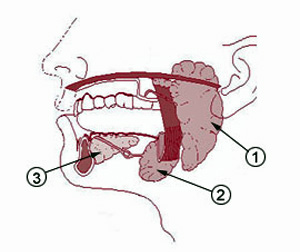Testing a part of a person's saliva gland may be a way to diagnose Parkinson's
disease, according to new research by the Mayo Clinic that will be presented at
the American Academy of Neurology's annual meeting in March.
Parkinson's disease is a difficult disease to diagnose. Currently the only way to pinpoint the disease is to do a clinical exam to analyze a person's symptoms. To achieve a definitive answer, an autopsy is performed on the brain after a person has passed away.
Charles Adler, M.D., Ph.D., and main researcher of the study said:
The study consisted of 15 people with a mean age of 68 who had Parkinson's disease for an average of 12 years. The participants chosen had also responded well to Parkinson's medication and did not have any previous saliva gland issues.

Diagram of the saliva glands.
1) Parotid Gland. 2) Submandibular Gland. 3) Sublingual Gland.
Two different saliva glands were
biopsied: the minor saliva glands in the lower lip and the submandibular gland.
The extracted tissues were then analyzed for evidence of the irregular
Parkinson's protein.
Researchers suggest that one of the most important potential advantages this test could have is creating more accurate clinical trials. Parkinson's clinical trial participants currently do not always have Parkinson's disease, making it harder to test new therapies.
In nine of the eleven patients who had an adequate amount of tissue to examine, the irregular Parkinson's protein was found. The rate of positive outcomes in the biopsies of the lower lip glands seemed much lower than for the lower jaw gland.
Dr. Alder explained:
Diagnosis is based on medical history, an assessment of symptoms and signs, a physical and neurological analysis, and eliminating possibilities of other disorders. Close to 30 percent of patients may be misdiagnosed early on in the disease.
Even though Parkinson's cannot be cured, medications can greatly reduce symptoms
Parkinson's disease is a difficult disease to diagnose. Currently the only way to pinpoint the disease is to do a clinical exam to analyze a person's symptoms. To achieve a definitive answer, an autopsy is performed on the brain after a person has passed away.
Charles Adler, M.D., Ph.D., and main researcher of the study said:
"We have previously shown in autopsies of Parkinson's patients that the abnormal proteins associated with Parkinson's are consistently found in the submandibular saliva glands, found under the lower jaw. This is the first study demonstrating the value of testing a portion of the saliva gland to diagnose a living person with Parkinson's disease. Making a diagnosis in living patients is a big step forward in our effort to understand and better treat patients."
The study consisted of 15 people with a mean age of 68 who had Parkinson's disease for an average of 12 years. The participants chosen had also responded well to Parkinson's medication and did not have any previous saliva gland issues.

Diagram of the saliva glands.
1) Parotid Gland. 2) Submandibular Gland. 3) Sublingual Gland.
Researchers suggest that one of the most important potential advantages this test could have is creating more accurate clinical trials. Parkinson's clinical trial participants currently do not always have Parkinson's disease, making it harder to test new therapies.
In nine of the eleven patients who had an adequate amount of tissue to examine, the irregular Parkinson's protein was found. The rate of positive outcomes in the biopsies of the lower lip glands seemed much lower than for the lower jaw gland.
Dr. Alder explained:
"This study provides the first direct evidence for the use of submandibular gland biopsies as a diagnostic test for living patients with Parkinson's disease. This finding may be of great use when needing definitive proof of Parkinson's disease, especially when considering performing invasive procedures such as deep brain stimulation surgery or gene therapy."
Parkinson's, A Progressive Disease
Parkinson's disease is an accelerating disease of the nervous system that affects movement. It starts slowly, sometimes with an unnoticeable hand tremor. Tremors are the hallmark symptoms of Parkinson's - the disease also comes with stiffness and slowing of motor skills.Diagnosis is based on medical history, an assessment of symptoms and signs, a physical and neurological analysis, and eliminating possibilities of other disorders. Close to 30 percent of patients may be misdiagnosed early on in the disease.
Even though Parkinson's cannot be cured, medications can greatly reduce symptoms
No comments:
Post a Comment